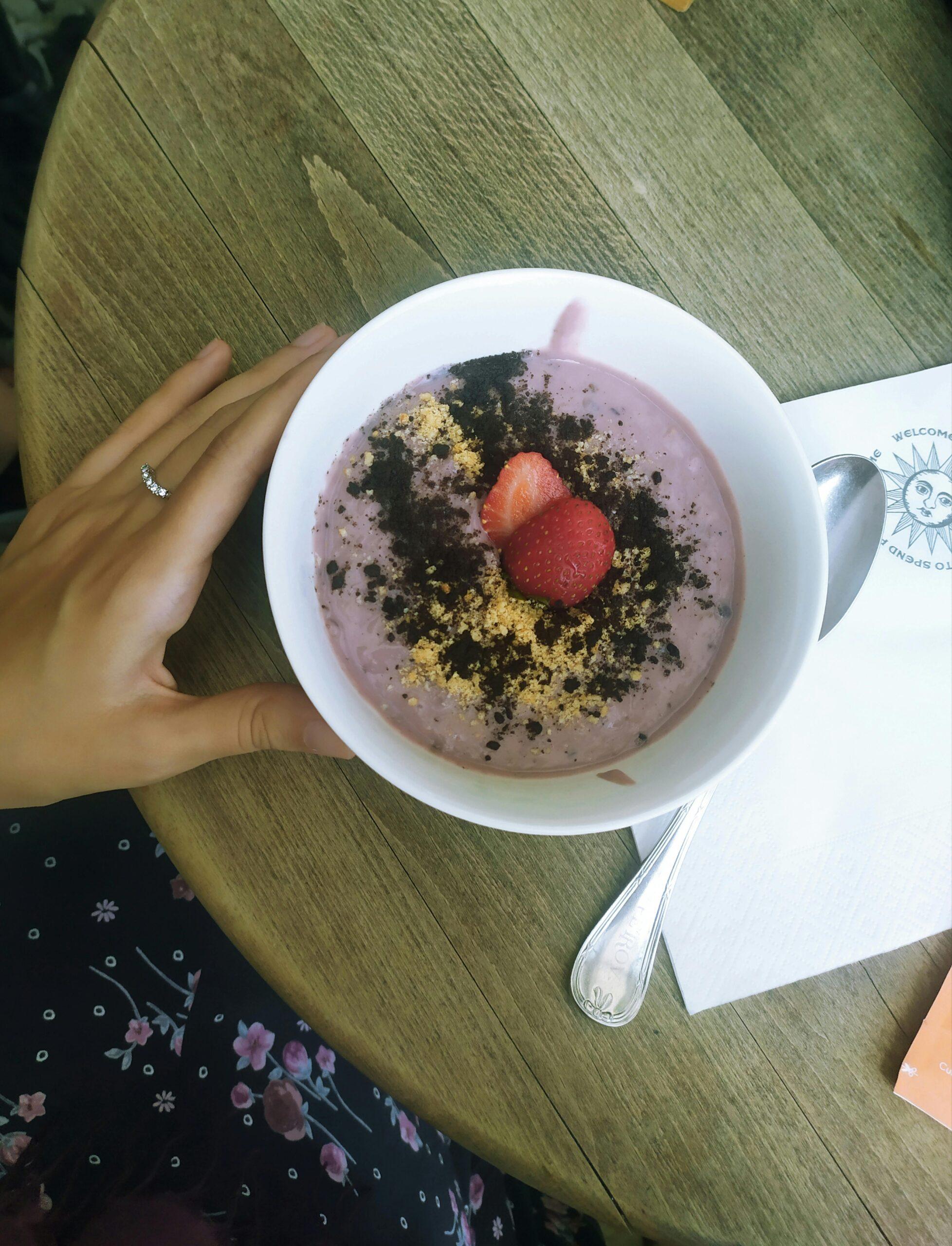Something that often surprises our patients is that, while many principles of healthy eating apply to all people, men and women have very different nutritional priorities based on their physiological and hormonal differences. Some of these differences include metabolic rate, muscle mass, bone health, heart health, prostate health, and differing iron needs, among others. Thus, the essential nutrients for men to incorporate into their diet aren’t identical to the ones important for women. But with so much information out there, it can be challenging to determine which nutrients are most important to prioritize. That’s why we’re focusing on six essential nutrients for men to incorporate into their diets—and how nutrition can play a role in addressing common health challenges that men face.
Fiber
Fiber is a nondigestible carbohydrate that performs countless functions in the body, from stabilizing blood sugar to promoting gut health.
There are two main types of fiber: soluble fiber and insoluble fiber. Soluble fiber is found in oats, barley, apples, beans, and chia seeds. It soaks up water in the body and expands, helping to slow down digestion and fill you up. Insoluble fiber is found in cauliflower, nuts, Brussels sprouts, and blackberries. It’s the “roughage” that adds bulk in the GI tract and keeps things moving through our system.
Why is fiber such an important component of nutrition for men? According to the CDC, a higher percentage of men (41%) than women (32%) have prediabetes, and heart disease is the leading cause of death for men in the United States. Fortunately, soluble fiber is the MVP when it comes to both blood sugar and cholesterol control. Here’s why.
Soluble fiber and blood sugar: Soluble fiber becomes a gel-like substance in the GI tract. This gel slows down digestion and thus the absorption of sugar into the blood. When we eat sweets along with fiber (think: dark chocolate + fresh berries + almonds), blood sugar levels are less likely to spike.
Soluble fiber and cholesterol: Research consistently shows that soluble fiber can lower LDL cholesterol and decrease the risk of cardiovascular disease. Soluble fiber helps lower blood cholesterol by binding to cholesterol in the small intestine and preventing its absorption into the blood.The combination of inflammation and excess cholesterol in the blood contributes to conditions like atherosclerosis, or plaque in the arteries, that increase heart disease risk.
Finally, fiber is an essential nutrient for the prevention of colon cancer, the third most common cancer diagnosis among men.
Best sources of fiber:
- Fruits
- Vegetables
- Whole grains (brown rice, quinoa, oats)
- Nuts, seeds
- Beans, legumes
Pro tip: If you don’t typically eat tons of fiber, start slow! Begin by adding a cup of berries to your breakfast, instead of eating a massive kale salad daily. Be sure to hydrate, too. Eating lots of fiber without drinking enough water can cause constipation.
Lycopene (Antioxidant)
You’ve probably heard of antioxidants. Antioxidants work against compounds called reactive oxygen species (or ROS) that produce free radicals and cause oxidative stress in the body. Oxidative stress has been linked to an increased risk of cancer and heart disease, two of the top killers of American men.
Lycopene is an antioxidant that’s part of a class of plant pigments called carotenoids. Carotenoids give fruits and veggies like carrots, watermelon, tomatoes, and grapefruit their vibrant colors. A potent antioxidant, lycopene is one of the most effective free radical scavengers of all the carotenoids, per a 2013 review published in the Annual Review of Food Science and Technology.
What’s more, lycopene may be particularly protective against prostate cancer, which was the leading cancer diagnosis among men in the US. Lycopene may decrease cancer risk and slow cancer growth by interrupting cancer cell growth and promoting apoptosis, aka programmed cell death.
A comprehensive review of nutrition and prostate cancer found that some studies have demonstrated an association between higher lycopene intake and decreased prostate-specific antigen (or PSA) levels. Elevated PSA levels are a primary biomarker for prostate cancer risk.
The bottom line: there’s not enough evidence to conclude that eating lycopene-rich foods prevents prostate cancer in men. That said, multiple studies have shown an association between higher lycopene intake and decreased incidence of prostate cancer in men.
Best sources of lycopene:
- Raw tomatoes
- Tomato paste, sauce, juice
- Watermelon
- Guava
Pro tip: Opt for organic tomatoes if you’re able and always try to pair lycopene foods with a source of fat, like olive oil, cheese, or avocado. The body absorbs lycopene better when it’s consumed along with fat (you’re welcome).
Vitamin C
We all know vitamin C is important for immune health, but did you know it’s also an essential vitamin for male fertility? A meta-analysis found that higher intakes of vitamin C improved spousal pregnancy rate and sperm parameters in infertile men.
Just remember: most supplements aren’t regulated by the FDA, so it’s hard to know exactly what you’re getting. Supplements are also far more concentrated than whole food sources of vitamins and minerals. As a result, we recommend talking with your dietitian before starting a supplement regimen. An RD can help you choose a safe brand and dosage for your optimal health.
Best sources of vitamin C:
- Tomatoes
- Bell peppers
- Citrus fruits (lemon, oranges, grapefruit)
- Strawberries
- Mango
- Papaya
- Pineapple
Pro tip: Infuse your water with vitamin C-rich fruits for a healthy and hydrating beverage. We love adding lemon and pineapple chunks to our water pitcher for a spa day-inspired sip.
Vitamin D
Vitamin D is kind of a big deal. Why? Vitamin D deficiencies have been associated with everything from a greater risk of respiratory infections to type 2 diabetes.
For men, vitamin D may be particularly important for hormonal health. A review of the literature found that most studies on the topic identified a potential beneficial role of vitamin D on male reproductive health, particularly through a better sperm motility. While more research is needed to confirm the benefits of vitamin D for male reproductive health, current research suggests a potential benefit.
Best sources of vitamin D:
- Egg yolks
- Salmon
- Tuna
- Mackerel
- Sun-dried mushrooms
- Fortified cow’s milk, yogurt, non-dairy milks, cereals
Pro tip: Sun exposure is the best way to boost your vitamin D levels. Experts recommend spending about 15 minutes in the sun daily (sans sunscreen) to kickstart vitamin D activation in the body. Of course, this guideline is subject to change depending on your medical history, your age, and where you live. Also, research has suggested that there may be a link between vitamin D consumption and COVID-19 – more on that here.
Omega-3s
Men aren’t the only ones who need to prioritize healthy fats and avoid saturated fat. However, much like fiber and lycopene, omega-3s may protect against some of the most common diseases that occur in men. By now you know those include cancer and heart disease. Stroke, respiratory diseases, and diabetes are also up there.
You’ve probably heard about the health benefits of omega-3 fatty acids, so we’ll just give you a quick refresher. Omega-3s are a type of polyunsaturated fatty acid that helps fight inflammation, maintain cell shape and function, and support brain and heart health. Research suggests that adequate omega-3 intake may also help decrease symptoms of depression.
Omega-3s support men’s heart health by combating inflammation in the body that contributes to blood vessel damage and impaired blood flow to the heart. They also help decrease triglyceride levels in the blood and lower the risk of blood clots. All of these benefits can help prevent common cardiac events that occur in men, like heart attacks and strokes.
Best sources of omega-3s:
- Fatty fish (salmon, tuna, mackerel, sardines, lake trout)
- Walnuts
- Flax seeds
- Chia seeds
Pro tip: Aim to eat at least two 4-oz. servings of omega-3-rich fish per week. Four ounces is about the size of your palm + first knuckle.
Zinc
Similar to lycopene, zinc is one of the most important nutrients for prostate health. Some studies report that the micronutrient may help prevent prostate cancer growth and metastasis by deactivating a specific protein that prevents apoptosis.
One note: more zinc isn’t always better. Both too little and too much of the micronutrient may actually increase prostate cancer risk and progression, per Memorial Sloan Kettering Cancer Center. It’s recommended that men 19 and older consume about 11 milligrams (mg) of zinc per day. For reference, one 3-ounce beef patty serves up about 5.3 mg of zinc, or almost 50% of a man’s daily recommended intake.
Best sources of zinc:
- Oysters
- Beef
- Crab
- Lobster
- Cashews
- Pumpkin seeds
- Fortified cereals
Pro tip: Add a handful of pumpkin seeds into your Strawberry Oat Breakfast Bowl (recipe below) to up your zinc intake at breakfast. Better yet, double up and top your breakfast bowl with a spoonful of cashew butter.
Bonus Recipe: Strawberry Oat Breakfast Bowl Two Ways, With Zinc

Strawberry Oat Breakfast Bowl Two Ways, With Zinc
Ingredients
Method
- Add all oatmeal ingredients to a large container with an airtight lid and stir well.
- Seal and place in the refrigerator overnight (or at least 6 hours).
- Divide the oats between four bowls and pile each with strawberries, pepitas and almonds.
- Add additional almond milk or coconut milk if desired.
- Add the oats, chia seeds, coconut, maple syrup, coconut milk, and almond milk to a medium-sized pot.
- Bring to a full boil over medium-high heat, then reduce heat and simmer for 15 to 20 minutes, stirring occasionally, until oatmeal has thickened and the liquid has been absorbed.
- Remove from heat and stir in vanilla extract.
- Divide between four bowls and top with strawberries, almonds, and nuts, along with additional almond and/or coconut milk, if desired.
Work with a Culina Health registered dietitian
At Culina Health, our mission is to help you incorporate essential nutrients into your diet in a way that you actually enjoy—because that’s the only way to create lasting change.
Looking for more recipes that feature essential nutrients for men, or just want more general healthy eating information? Need help managing a health condition? Whatever the reason, our registered dietitians are here to support you. Through 1:1 virtual sessions, they work with you to create a personalized care plan to help you achieve your goals. Book a session today and pay as little as $0 out of pocket with insurance.





